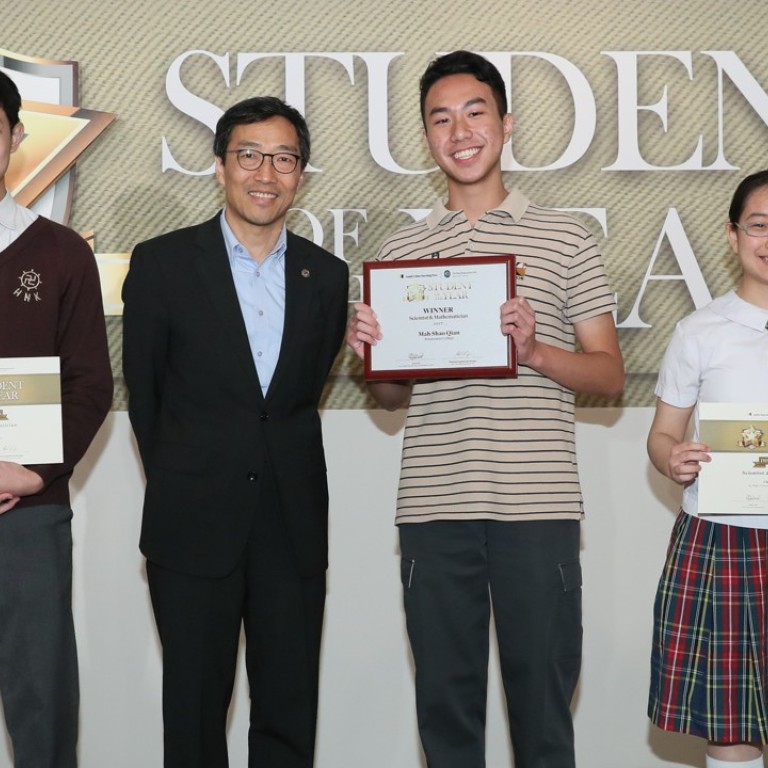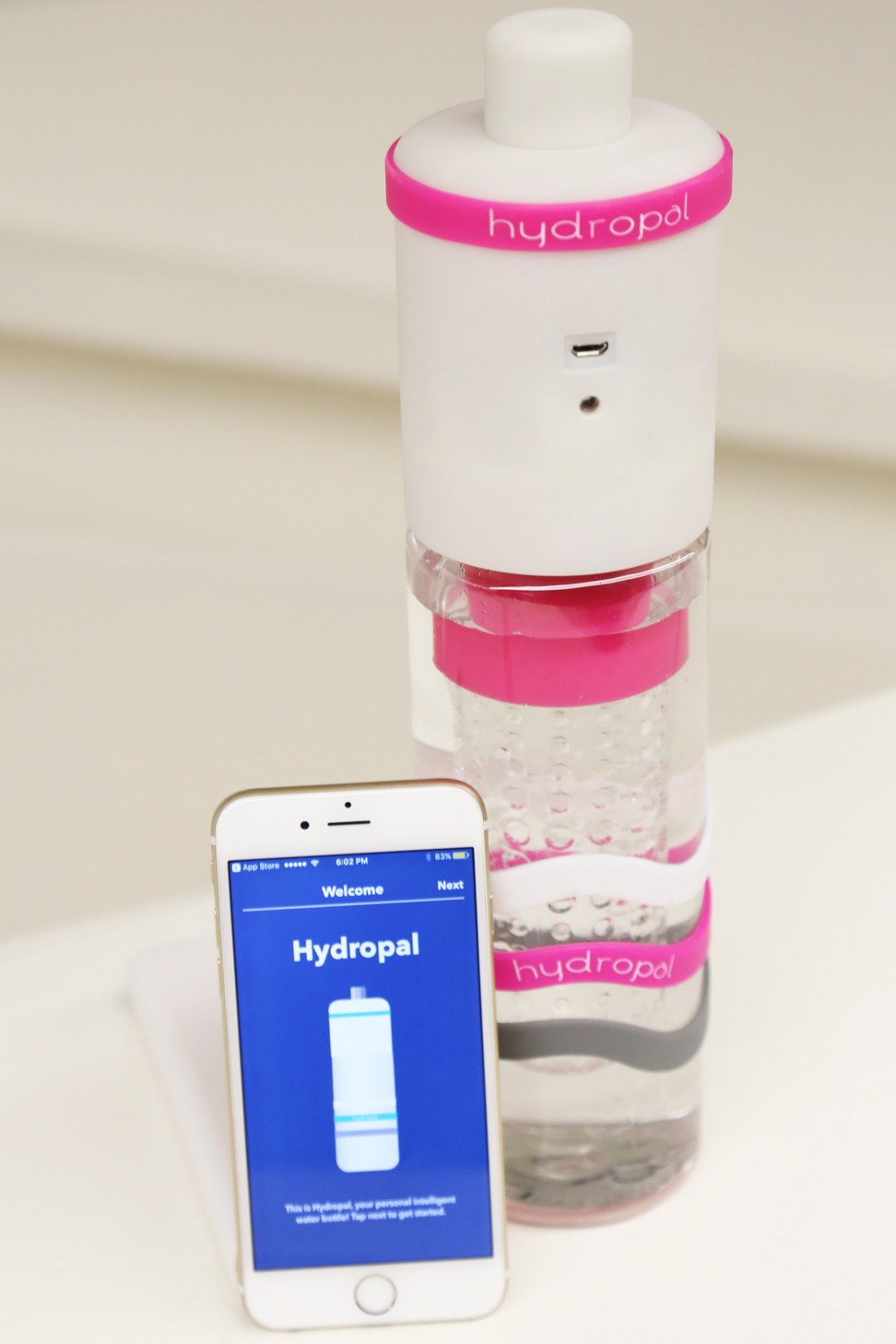
Elon Musk-inspired entrepreneur sees science, technology driving Hong Kong’s start-up culture
Mah Shao-qian, a recent Student of the Year Awards winner, said there was increased emphasis on the start-up culture in Hong Kong, which helps encourage more people to become entrepreneurs
When Mah Shao-qian was named one of the winners of the South China Morning Post’s Student of the Year Awards in March this year, he said science and technology could help provide a way for Hong Kong to diversify its industries, while contributing to the improvement of society.
It is a belief backed up by the 18-year-old Mah’s recent activities as an entrepreneur.
Mah and 25 of his schoolmates at Renaissance College, a private independent international school, formed a company called Hydropal as part of a programme run in Hong Kong by the non-profit youth organisation Junior Achievement (JA).
A market research conducted by Hydropal found that most people in the city do not drink enough water. The start-up produced reusable water bottles with sensors to track a user’s water intake and a smartphone app to calculate how much water a user should drink based on weight, age and level of physical activity.
That experience has led Mah, who recently graduated as valedictorian of his class, to pursue a degree in mechanical engineering at the University of California, Berkeley – the flagship research institution of that state’s public university system.
Mah, winner in the Scientist and Mathematician category of the 37th annual Student of the Year Awards sponsored by The Hong Kong Jockey Club, talked with the Post‘s Iris Deng ahead of his move to the US.
He discussed his passion for technology and aeronautics, how he was inspired by billionaire entrepreneur Elon Musk, and the cultural change in Hong Kong, where more innovative start-ups are emerging. Excerpts from the interview follow:
Q: What helped spark your interest in science and technology when you were growing up?
A: It started when I was seven or eight. My parents gave me an iPod … and I realised how limited its functionality was. I got into the jailbreaking culture community where I tried to lift the restrictions that Apple put in the device. I think that’s when I started to realise that I like breaking things – not in a destructive way – but breaking barriers … in terms of technology. So I started programming and making applications.
I learned programming on YouTube and through reading stuff. When I was nine years old, I wasn’t aware of any formal training available, so I mainly followed YouTube projects and other people’s code, and see how they would do it.
Q: Does your family have a background in science and technology? How have they supported your interests?
A: Without any technology background in the family, my parents are supportive of it. Sometimes it boggles their minds, like how a computer or a hardware component can be so costly.
I feel one big problem in Hong Kong is that a lot of parents have very specific ideas of what they want their children to do – emphasising jobs, such as a lawyer or doctor, which are traditionally financially stable. I’m glad that my parents are supportive and did not force me into a particular career path.
Q: What made you interested in aeronautics and Elon Musk?
A: The one thing that triggered [my interest in aeronautics] is programming, which came about from my interest in electronics. I stumbled upon how to construct rockets, which are some of the most beautiful and intricate machines.
It took me three days to build a 1.5-metre tall rocket, constructed with wood and paper. According to my [computer] simulation, it could fly up to 600 metres high, which is very illegal in Hong Kong.
I see Elon Musk as my role model and inspiration because he didn’t stop when he became very rich. He’s still pursuing crazier and crazier ideas. He risks his financial well-being every time he pursues projects with Tesla and SpaceX for more altruistic reasons.
I was influenced by people like Elon Musk, who talked about how it’s necessary for humanity to become a multiplanetary species. He’s just someone who really cares about the future in general.
Q: Are you willing to do space travel if given the chance?
A: Personally, I’m scared of heights. I would be more comfortable making the system that would allow people to be in space. But if I’m given the opportunity to go to Mars, I think I’ll take it.
Q: You co-founded a start-up called Hydropal, in which you served as chief technology officer. How was that company formed?
A: It was a project under the eight-month Junior Achievement Company Programme in 2016. Hydropal made a smart bottle that tracks and alerts water drinking behaviour.
It was not meant to be a start-up, just something that we made for the competition [under that programme] and grew from there. We thought our vision went beyond the scope of the competition, so we continued … and showcased our product in tech fairs around Hong Kong.
We manufactured more than 100 bottles by hand at school. I developed the rudimentary prototype in a week, and the product in about two months. We had zero experience in electronics, so I learned how to assembled everything and then taught my 25 teammates.

Q: What was the most important lesson you learned from that experience as an entrepreneur?
A: The most important thing I learned is that when you start something, it’s okay to not know anything. What’s not okay is finishing and still not knowing anything. During the process, if you’re diligent enough and have the right attitude, it’s possible even for a 16-year-old [to accomplish it].
You shouldn’t say that ‘start-ups are not for me, I should do it after university’, or ‘it’s not for me I don’t know enough’. You can learn. That is especially true right now given that we have such great access to resources, both digital and physical, in Hong Kong.
If someone is interested in science and technology and start-ups, don’t let your age or your lack of knowledge hold you back.
Q: What are your thoughts about winning the Student of the Year Award in the Scientist and Mathematician category?
A: I never really expected it, but I feel honoured and happy to win the award.
It also gave me hope about the future of Hong Kong – how we’re really looking at entrepreneurship and using science and technology as a way to make sure that Hong Kong is not obsolete in the future.
Now there’s more of an emphasis on start-up culture and the home-grown sense you can build your own thing in Hong Kong. That’s a shift in culture that I’m really glad to see more than anything.
Q: Do you see a stronger interest in STEAM – science, technology, engineering, the arts and mathematics – among your fellow students in Hong Kong?
A: I don’t think it’s nearly as prevalent here compared with a place like mainland China … I want to help to shift that mentality. If I didn’t get that iPod 10 years ago or there was no JA company programme, I probably wouldn’t be as interested in science and technology as I am today. I would’ve pursued a more traditional pathway.
I want to, at least, get more people aware that as a student, you can do [science and technology or entrepreneurship]. It’s not limited to large corporations or university-level educated students. You can start right now.

